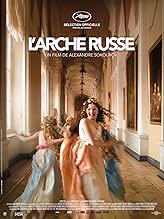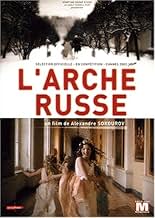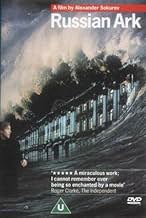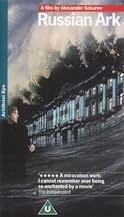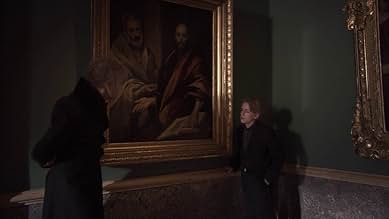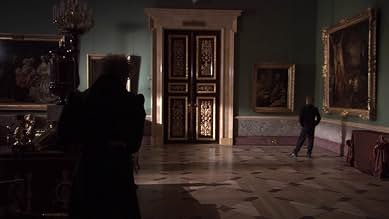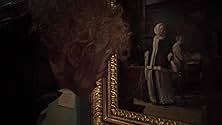Un aristócrata francés del siglo XIX, conocido por sus mordaces memorias sobre la vida en Rusia, viaja a través del Museo Estatal del Hermitage encontrándose con personajes históricos de los... Leer todoUn aristócrata francés del siglo XIX, conocido por sus mordaces memorias sobre la vida en Rusia, viaja a través del Museo Estatal del Hermitage encontrándose con personajes históricos de los últimos 200 años.Un aristócrata francés del siglo XIX, conocido por sus mordaces memorias sobre la vida en Rusia, viaja a través del Museo Estatal del Hermitage encontrándose con personajes históricos de los últimos 200 años.
- Dirección
- Guión
- Reparto principal
- Premios
- 10 premios y 15 nominaciones en total
Reseñas destacadas
The film begins in the dark with the narrator (apparently Sokurov) commenting about how little he sees. "My eyes are open", he says, "and yet I see nothing". He does not know where he is but apparently has just died in an accident of some kind. Is this a movie? A play?" he asks. He receives no answer except a vision of 18th century aristocrats moving slowly into the Tsar's palace. An elegant white-haired man in a black cloak (Sergey Dreiden) suddenly appears and escorts the confused narrator into the corridors of the grand palace. "Everyone knows the present, but who can remember the past", says the stranger as they walk from one ballroom to the next, witnessing great works of art as well as ghost-like presences from Russia's past. We see works by El Greco, Rubens and Van Dyck in their awesome splendor. We run into Peter the Great thrashing a general, Catherine the Great looking for the bathroom, and Nicholas II, the last Russian Tsar hosting the Great Royal Ball of 1913, the last such formal occasion of its kind.
As we enter the Great Nicholas Hall, the opulent room is filled with thousands of aristocrats dancing the mazurka in gorgeous period costumes. A full orchestra is playing in the background and young soldiers are nattily dressed in their uniforms. How beautiful it all seems and how it appears they were destined to live forever but we all know how the nasty Bolsheviki spoiled the party. Ah yes, how green was my valley then. Sokurov said he wanted to make a whole film "in one breath" and he has succeeded in simulating the breathing process, pulling us in, then moving us out as we feel the rhythm of our own life beating with the swirl of lost humanity. At the end of Russian Ark, we see the peaceful flow of a river outside the hall to which the narrator comments, "The flow is forever. Life is forever." Having completed the past, our invisible guide is now ready to move into the endless silence that is, in the phrase of the Anglican priest Thomas Kelly, "the source of all sound".
Not knowing a lot of Russian history, some of the scenes didn't make much sense, but I did cotton on to Anastasia being late for tea. Maybe she got away after all. There was nothing from the Soviet era, except a brief scene during the German siege of Lenningrad (a million died, mainly from starvation, and many made coffins for themselves before they expired). This seems appropriate, since the communists contributed nothing to the buildings, which were started by Peter the Great and added to by his successors. A bad fire in 1837 was followed by extensive reconstruction and many of the rooms we see in the film date from that time.
I suppose this is the first film in which the set is the star and the actors merely props. There is in fact one dramatic part, that of the French Marquis who attended the Tsar's court in the 1840s, and who is somehow able to take us backward and forward in time. Even he is a bit two-dimensional, in fact the other, unseen, presence (the voice of the director of the film) is as real.
Towards the end we attend a great ball, and the Marquis gets to dance the Marzurka again. The music is great (is that Glinka conducting something of this own?) and the atmosphere gay (as somebody says `you can't be shy for the Mazurka') and for a moment history is forgotten. But we don't have a plot, the characters are cut-outs (with the exception of Catherine who seems to have been one of the more boisterous Empresses in history) and, basically, nothing happens. Yet I found myself absorbed by it all, occasionally wishing I could click my mouse to zoom in on an interesting painting. Ironically, much of the art is non-Russian, so `Russian Ark' is something of a misnomer `Euro-Ark' is nearer the mark. At the end of the day, though, I am lost with admiration for the cinematographer, who managed to keep his digital camera running and pointed in the right direction for 90 minutes without making a mistake. Madness, brilliant Russian madness.
For their bravura, awe-inspiring cinematic tour-de-force, director Alexander Sokurov and cinematographer Tilman Buttner take us into the famed Hermitage Museum and Winter Palace in St. Petersburg, providing us with a grand tour not only of the opulent rooms and famous artwork contained therein, but of 300 years of Russian history as well, as various vignettes involving famous people (from Peter and Catherine the Great to Nicholas and Alexandra) and events are played out within the glorious gilded walls.
`Russian Ark' is a bold and audacious project that is the cinematic equivalent of a breathlessly performed high wire juggling act. We know that one false move on the part of the actors or the cameraman, one missed cue or accident of fate could bring the whole delicately poised enterprise crashing down around them. How often, one wonders, did a perfectionist like Sukorov have to resist the temptation to yell `Cut!' to his actors and crew? It's truly amazing to see just how beautifully planned and flawlessly executed the final product turns out to be, especially the ball sequence at the end which features hundreds of dancers and spectators who are set in beautifully choreographed and constantly whirling motion. What's most remarkable is how much of a participant the camera itself is in the proceedings. Not content to stand idly by and observe the scene like some passive onlooker, the camera moves right into the center of the action, gliding in and out of the crowds with utmost grace and precision. Visually, the film is stunning, with exquisite costumes and furnishings as far as the eye can see. Indeed, `Russian Ark' is, among other things, a veritable feast for the eyes, the likes of which we have rarely seen on film before.
`Russian Ark' does have something of a `plot,' involving a narrator whom we never see, a 21st Century filmmaker we assume it's Sukorov himself - who's found himself inexplicably caught in some type of time warp and magically transported to this strange spectral world. There's also a bizarre European `ghost' figure from the unspecified past who comments - and occasionally attempts to intrude on the actions taking place around him. But these two characters are of far less interest to the audience than the aural and visual delights of the film itself.
`Russian Ark' is a wonder to behold, for it is much more than just an `exercise,' a `gimmick,' or even an `antithesis' to Eisenstein; it is a vibrant work of art that challenges the limits of its medium and reminds us of just what it is about movies that we love so much.
Russian Ark portrays the Hermitage as a kind of cultural and historical ark floating on centuries of Russian seas. The narrative device is a shadowy eighteenth century Frenchman who wanders the halls and time periods, commenting often with good-natured European condescension on what he sees. He is accompanied by a Russian who is never seen, and who questions him about his comments. The movie ranges through time with appearances of Peter the Great, Catherine II, Pushkin, Nicholas II and his family, generals, maids, flunkies and diplomats. The Frenchman, played with great style by Russian actor Sergei Dreiden, takes us to painting and sculpture galleries, kitchens, ballrooms, storerooms, basements and living quarters as we observe things that happened in the Hermitage over the centuries.
At first, I was very aware of the technical feat of no cuts. Gradually, though, I think most people just relax and accept the skill of the director and photographer, and become immersed in what they are seeing. A kind of unreal imagery takes hold. The movie ends with the last dance held in the Great Ballroom before WWI. Hundreds of actors and dancers, in full costume, swirl around this ornate setting, and swirl around the camera as well, while the camera glides through the crowds. It's a terrific scene, and is followed by the end of the dance with all the hundreds of guests making their way through the halls and staircases to leave the building, with the camera facing them and moving along in front of them.
This is a highly unusual film, probably a great one.
¿Sabías que...?
- CuriosidadesShot in a single take. The first three attempts were cut short by technical difficulties, but the fourth was successful.
- PifiasMany extras look to the camera and they quickly return to a default mark.
- Citas
The Time Traveller: Sir. Sir. A pity you're not here with me. You would understand everything. Look. The sea is all around. And we are destined to sail forever, to live forever.
- ConexionesEdited into Spisok korabley (2008)
- Banda sonoraMazurka
(from opera "A Life For The Tsar")
Music by Mikhail Glinka
Performed by Mariinsky Theatre Orchestra
Conducted by Valery Gergiev
Selecciones populares
- How long is Russian Ark?Con tecnología de Alexa
Detalles
Taquilla
- Recaudación en Estados Unidos y Canadá
- 3.048.997 US$
- Fin de semana de estreno en EE. UU. y Canadá
- 29.022 US$
- 15 dic 2002
- Recaudación en todo el mundo
- 8.691.860 US$
- Duración
- 1h 39min(99 min)
- Color
- Mezcla de sonido
- Relación de aspecto
- 1.78 : 1






